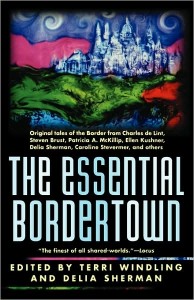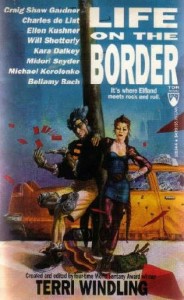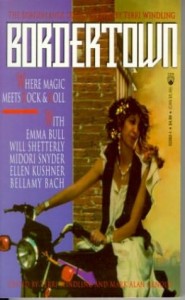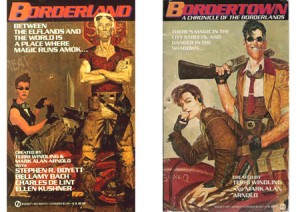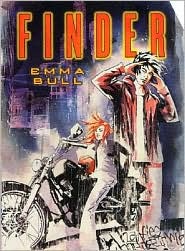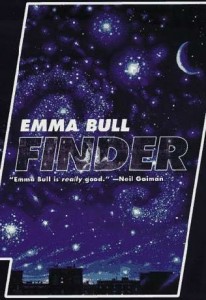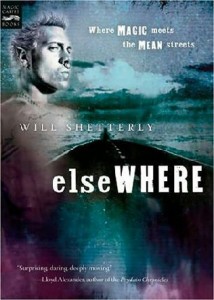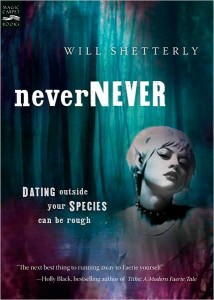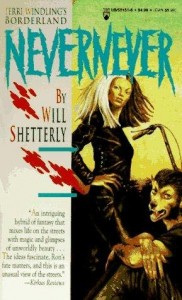Borderland, edited by Terri Windling and Mark Alan Arnold (Tor, 1986)
Bordertown, edited by Terri Windling and Mark Alan Arnold (Tor, 1986)
Life On The Border, edited by Terri Windling (Tor, 1991)
Finder, by Emma Bull (Tor, 1994)
Elsewhere, by Will Shetterly (Tor, 1991)
Nevernever, by Will Shetterly (Tor, 1993)
The Essential Bordertown, edited by Terri Windling and Dalia Sherman (Tor, 1998)
“Where Magic Meets Rock & Roll”
Once upon a time, in a far off land much like our own, there was magic. Then, one day, it was gone, and the world was a much drearier place for it. But we coped.
Then the magic returned, and the world was changed forever. Once again, the lands of Faerie bordered the lands of Man, and in the middle, there arose Bordertown, from the ashes of an unnamed mortal city. It was a place of magic, music, excitement, hope, dreams, energy, death, despair, hopelessness, nightmares, heroes and villains, men and monsters, and above all, people. A living, thriving town full of unpredictable wonders and untamable shadows. The bastard child of Haight-Ashbury and SoHo and Hollywood, the black sheep cousin of Underhill and Arcadia and Tir Na’Nog, the seductive and disreputable and scandalous older cousin your parents always told you to stay away from.
In short, the perfect place for runaways from both sides of the Curtain to run to. The only real place where humans and the Fae (the Trueblood) could interact on something resembling remote terms, Bordertown attracted all sorts of people. The starstruck, the dreamers, the hopeless and helpless, the runaways, those obsessed with the Fae, the predators. And that’s where it all begins … in Bordertown.
Back in the mid-80s, New American Library wanted a fantasy anthology series comparable to the then-popular Thieves World. They contracted editors Terri Windling and Mark Alan Arnold for the job, and didn’t realize until too late that they’d created a monster. They wanted Thieves World. They got the Summer of Love mixed with Thomas the Rhymer and some serious social issues for flavor.
Windling and Arnold brought in some of the best in the urban fantasy field to help them flesh out their new world. Ellen Kushner, Charles de Lint, Emma Bull, Will Shetterly, Midori Synder, Craig Shaw Gardner and more all contributed. Bellamy Bach, an author who contributed to several of the anthologies, was actually a pseudonym shared by a number of New York-based creative talents, and it has since been revealed that the true author of all Bordertown-related Bach stories (and only the Bordertown stories!) was Terri Windling herself. Later, with the third book,Life on the Border, the series moved from NAL to Tor, where they’ve been ever since. And while authors have come and gone, the true inspiration behind the series, Terri Windling, has remained a constant as editor and occasional author.
There are seven books in all: four anthologies, one solo book by Emma Bull, and two solo books by Will Shetterly. Together, they comprise the down-and-dirty, nitty-gritty, flight-of-fancy grunge-rock-punk ballad known as Bordertown. How can I describe it? It’s a stylized vision of New York in the ’80s, leather-and-lace big-hair bands, and the Wild West, all rolled into one. Youth gangs, runaways, flamboyant rock-and-roll bands, Elven court politics, people seeking their dreams … it was all there. You could find your heart, lose your soul, find your dreams, lose your way, and always come back to the beginning, in Bordertown.
Terri Windling’s essay on the creation and history of Bordertown goes into much more detail, so I’ll let her tell that story through the link below. Let’s get on to the books themselves.
Borderland was the first, the introduction to a world where elves and humans shared an uneasy peace in a city teeming with music, magic, and unpredictability. We soon realize that just because they live together, they don’t always like one another. Because of the nature of the city, magic and technology work equally poorly, often fizzling with dangerous results. For every hero, there’s someone to play the predator. And still, hope perseveres.
Stephen Boyett turns in “Prodigy,” a symbolic and literal introduction to the world of Bordertown. Six years after the Change, a mortal city remains chaotic, transformed and devastated by forces beyond mortal comprehension. Scooter, a musician and wanderer, provides a symbol of hope to those people who make their home in the city, giving them music and the magic of music.
Terri Windling, as Bellamy Bach, gives us a story of a more “modern-day” Bordertown, “many years after” the previous story. Evocative and dangerous, “Grey” is a mystery that starts with blood under the fingernails, and ends with a song and a farewell. In between, there’s excitement, personal growth, and a curse. What more can you ask for?
Charles de Lint gives us “Stick,” about a ferret-owning, Harley-riding enigmatic hero of few words, a John Wayne hermit-warrior who rescues a girl from a pack of Truebloods, and winds up with trouble of his own.
Finally, Ellen Kushner tells the story of “Charis,” a mortal girl fascinated by elves, who gets involved in a little romance and a lot of political intrigue.
Bordertown continues the saga. Emma Bull and Will Shetterly join the team in “Danceland,” introducing us to characters such as Tick-Tick, Orient, Wolfboy, and Caramel. Excitement, danger, and murder abound in the club called Danceland. Note these characters, as they’ll appear again in Shetterly and Bull’s solo novels.
Midori Snyder’s contribution is “Demon,” which fleshes out Dragontown, and a whole new host of dangers and thrills. Then you have “Exile,” by Bellamy Bach, and “Mockery,” by Bach and Ellen Kushner. Both are excellent tales as we’ve come to expect from such accomplished authors.
Life on the Border turns the volume to 11, cranking up the energy and enthusiasm as the authors really hit their groove. It’s like the song right before intermission, when the music’s clearly gotten into the blood, and everyone’s dancing.
Ellen Kushner contributes “Lost in the Mail I-IX,” a story split into nine parts, scattered between the rest of the stories in the collection, and written in the form of a series of letters sent home by a young runaway, who experiences the glory and despair that best represents Bordertown.
Will Shetterly gives us “Nevernever,” a story of the popular Wolfboy, Bordertown’s only full-time half-man half-wolf. Charles de Lint recounts the story of “Berlin,” while Midori Snyder tells “Alison Gross,” a spooky little story half-based on the ballad of the same name. Witj Kara Dalkey, Bellamy Bach, Emma Bull, Craig Shaw Gardner and Michael Korolenko all throwing in their own dreams and nightmares as well, this volume is one of the best of an outstanding series.
Elsewhere is the first full-length Bordertown book. Starring Ron, aka Wolfboy, it’s the story about how a confused teen ran away from the World (mortal, that is), braved the dangers of the Nevernever, and came to Bordertown. Before he’s done finding himself, he’ll find love and hate, love and death, sanctuary and oppression, and one of the best bookstores in existence, Elsewhere. Oh, and he’ll get a little curse slapped on him, making him Wolfboy, one of a kind in a city that thrives on the unique. From the residents of Castle Pup, to the hallucinatory and obsessed Wharf Rats (who drink the Mad River and are all a little nuts for it), Ron will meet a host of fascinating characters.
Nevernever is the sequel to Elsewhere, continuing Ron’s story and throwing him muzzle-first into more danger and excitement than you can shake a guitar at. Secrets revealed, mysteries explained, and oh, of course, music and dancing and energy in the air.
Finder is Emma Bull’s solo novel, and it picks up on her characters of Tick-Tick (an elf) and Orient (a human with the ability to find anyone, or anything … hence the name). When a cop named Sunny Rico hires Orient to find a killer, it draws them all into a web of drugs, conspiracy, and desperate survival. A plague that affects only Elvish-blooded people threatens the life of Tick-Tick, and it’s a race against time to pull the threads together and save the day. But not everyone will walk away in the end…. This is right up there withWar For The Oaks in terms of quality and ambition, using the urban-fantastical landscape of Bordertown to tell a story of love, hate, dreams, and obsession. Hard-boiled and heartbreaking, it’s worth the cover charge and more.
Finally, we come to The Essential Bordertown: A Traveller’s Guide to the Edge of Faerie, the last of the anthologies in the series, and definitely the show-stopping finale to the whole shebang. Some old friends are back for the final number, such as Charles de Lint, Ellen Kushner, and Midori Snyder. And look, they brought new friends, like Elizabeth Kushner, Steven Brust, Felicity Savage, Patricia McKillip, and more. With new co-editor Delia Sherman, Windling delivers something satisfying and invigorating. With faux guidebook articles about Bordertown interspersed between the stories, on subjects such as Elven Etiquette, The Music Scene, What To Eat, and How To Get There, it’s better than Fodor’s and more intriguing than Lonely Planet.
So what’s the appeal of Bordertown? It has many. It is by far one of the best shared universe collections out there. It’s a superb example of the potential held by urban fantasy. It contains work by some of the genre’s best writers. And it touches upon universal subjects such as the desire to find one’s real self, the need to stretch and explore and grow, the love of music … it resonates. Fifteen years after worlds collided and magic first met rock and roll, Bordertown is still going strong, having captured itself a place in our subconscious and never letting go.
In short, it’s damned good stuff. The only way to truly experience it is to go out there, and actually pick up a copy. While most of the books are hard to find,The Essential Bordertown is recent enough that you should be able to find a copy. The others may take work, but are definitely worth the effort. The settings and characters are rich and filled with complex depths; they are evocative, and just plain -neat-. Who wouldn’t want to visit Bordertown? It’s like Oz, except a lot grungier, much more dangerous, and with much better music.
Just watch yourself, and remember, it’s never as easy as it seems.

